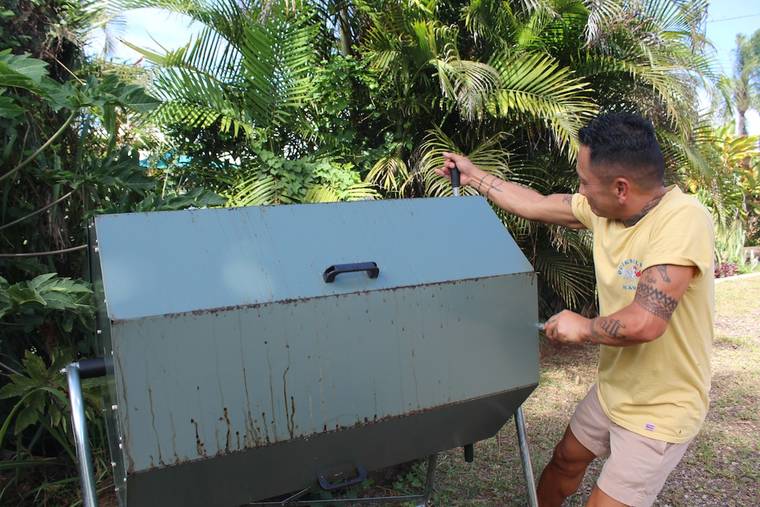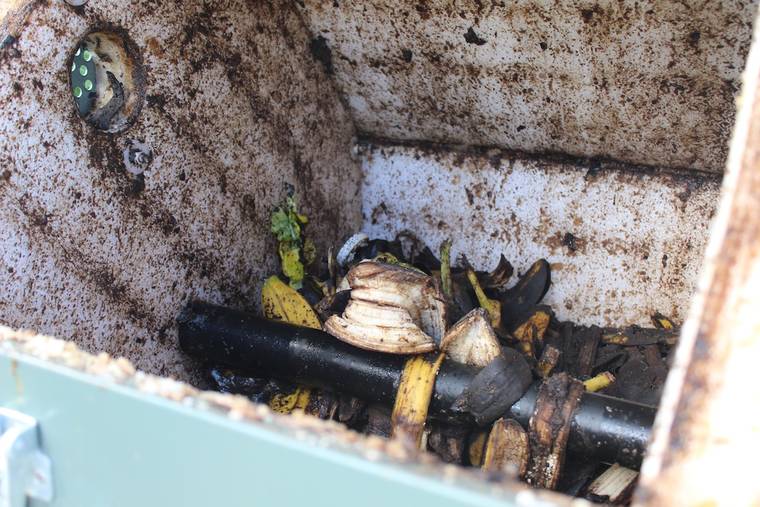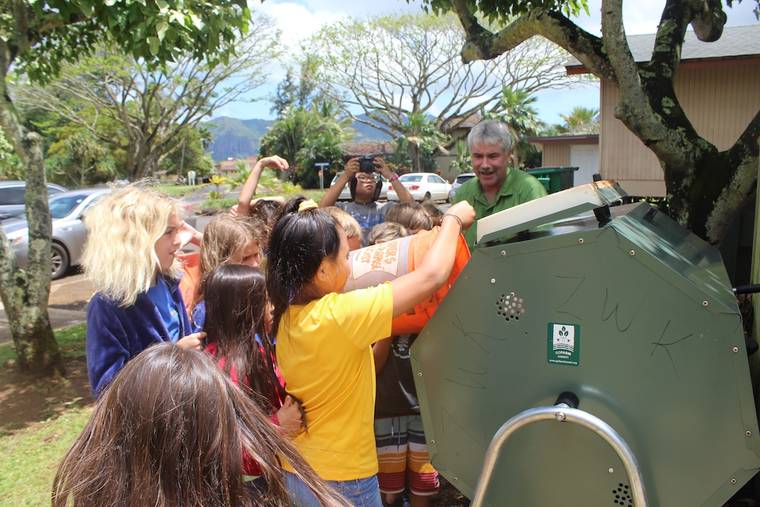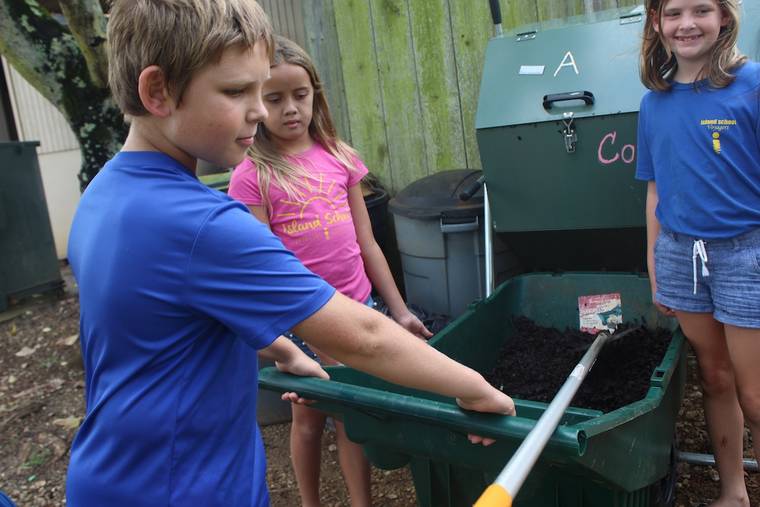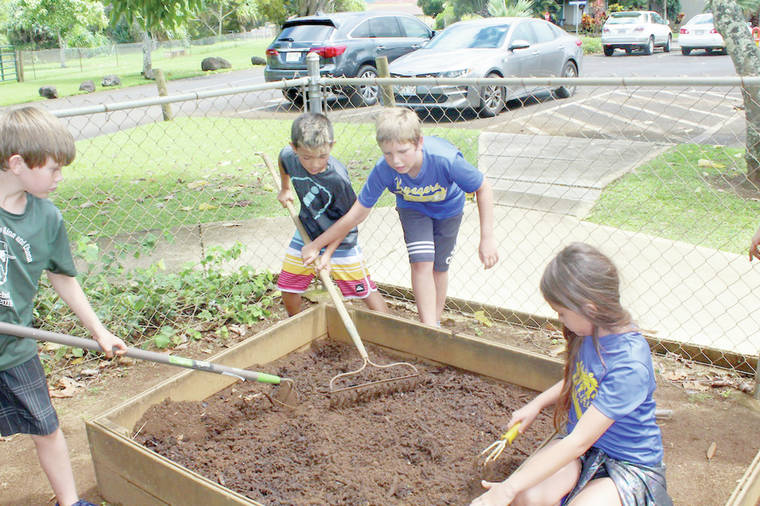PUHI — There’s an octagonal bin sitting outside the cafeteria at Island School and inside, things are growing.
Under the care of the third and eighth grade classes, microbes are multiplying in the bin, eating the scraps from their cafeteria lunches.
Daily the class drops banana peels and other food scraps, compostable plates and paper scraps into the bin. Daily they go out and check on it, turning the octagonal tumbler bin to mix up the material and checking on the different stages of decomposition.
Recently, they gathered to remove their first batch of compost from one side of the tumbler and add a few scraps to the mixture brewing in the other half of the bin. Then they mixed that nutrient-dense compost into soil for flowerbeds about 10 feet away.
“It smells like rotten oranges,” Island School third grader Gabi Leikam said as they opened the first compartment and dumped in a bucket of fruit peels and leftover veggies.
Another student commented the finished compost smells like dirt, though.
They measured the temperature of the bins while they were working. It was over 100 degrees Fahrenheit; a good environment for microbes, according to teacher Pat Gegen. Material most effectively decomposes at temperatures between 100 and 130 degrees.
“We’ve been getting the highest temperatures of all of the bins, “ Gegen said. “We’ve reached 140.”
Island School is just one of the groups on Kauai that’s hosting one of Zero Waste Kauai’s five brand new, Jora 400 compost tumblers. Kawaikini Public Charter School is hosting one as well, and there’s one at Eat Healthy restaurant, Kauai Community College, and with John Harder of Zero Waste Kauai.
The tumblers will be there for six months before they move on to different organizations. Zero Waste Kauai got them through a grant from Kauai County’s Department of Economic Development, Office of Sustainability, under the auspices of the nonprofit Garden Island RC&D.
Ben Sullivan, sustainability director for the county, said they partnered with Zero Waste Kauai on the grant as a way to “explore promising practices that will help us reduce our landfilling.”
He points out that organic waste makes up more than 50 percent of what goes into the landfill every year.
“On-site composting, and composting in general, is a solution with significant potential to reduce the amount of waste we send to the landfill every year,” Sullivan said. “ Experience gained from this project could help those involved and others look more seriously at alternatives such as on–site composting.”
It’s an island-wide experiment on several levels — a way to encourage recycling and bring awareness to reducing waste in the landfill, to experiment with different ways of composting, and to inspire a big-picture understanding of local food production.
Over at Eat Healthy in Kapaa, owner PJ Nagayaga is clicking into that big picture, ready to supply local farmers on a small-scale with nutrient-rich compost made from his kitchen scraps. He’s also prepping a few herb and vegetable beds that will add to his ingredient inventory and be nourished by the compost from the same kitchen.
“I’ve never done this before, so it’s a new project,” Nagayaga said as he took five minutes to turn the tumbler before the restaurant rush hit. “It’s good for us and it’s good for customers, helps them get educated, too.”
It’s simple and it doesn’t smell until you open the bin with the decomposing material inside, he says. In fact, Nagayaga’s bin is just across a fence from Eat Healthy’s dining area and he hasn’t received one complaint.
Zero Waste’s John Harder is doing experiments of his own with the last tumbler, trying to figure out what kinds of post-consumer products can be composted on-site.
“It’s a work in progress,” he said.
And that’s the point of the tumbler experiment — to do some community-led research and development, to find new and sustainable ways of responsible waste reduction, and to teach others about the value of reusing scraps versus throwing them away.
The tumblers will be at their current locations through about June, though Zero Waste has already agreed to let KCC keep theirs on their site through December, according to project organizer Ruta Jordans.
Once June rolls around, they’ll be ready to go to new homes where students, restaurants, resorts, schools or other entities can learn how to more effectively reuse their organic waste.
“When this first group is done we are hoping that they will want to purchase their own compost tumblers,” Jordans said.
Jordans says Zero Waste Kauai is now on the lookout for that next round of entities and organizations to host their compost tumblers. Interested parties should contact Jordans at 278-2021.
••• Jessica Else, environment reporter, can be reached at 245-0452 or at jelse@thegardenisland.com


